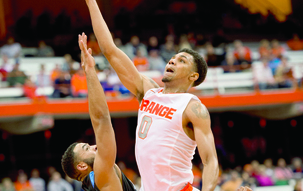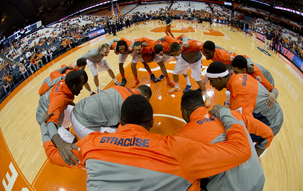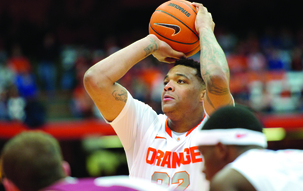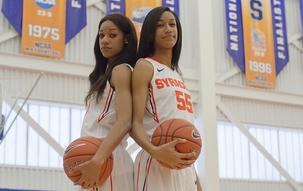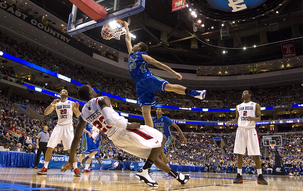Throughout Tyler Ennis’ childhood, his father — and often his coach — Tony McIntyre would ask him the same series of questions.
Do you even like basketball? Are you sure? Why don’t you show it on the court?
For years, McIntyre failed to see the competitive fire in his son’s game. Tyler would play up on his older brother’s teams. Dylan, two years ahead of Tyler, and Brandon, four ahead, were fiercer on the court.
McIntyre wondered if Tyler felt pressured to play the sport that controlled the family’s everyday life. It wasn’t that Tyler was passive. He was outgoing off the court, just not exclamatory on it. There was never any yelling. There was never frustration after a mistake or celebration after a success.
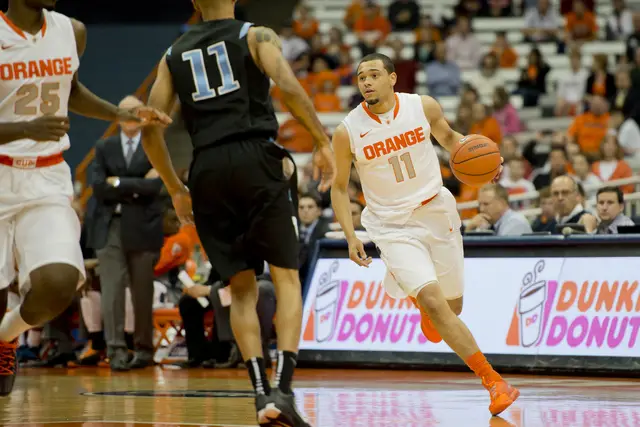
Ziniu Chen | Staff Photographer
So McIntyre would ask his son those questions. On the court after games. In the car on their way home. At the dinner table later that night.
The questions baffled Tyler because there were never any questions in his mind.
Only an answer: “That’s how it’s supposed to be.”
“I just played and that’s how I always was. It helps me in pressure situations and keeping guys in control and things like that. My dad always wondered why. I don’t know why.”
Tyler is preparing to be the seventh freshman to run the point for Jim Boeheim in the last three decades. But he’s far from an ordinary freshman — preposterous passing ability and catlike vision aside.
He’s as prepared a freshman Boeheim said he has ever had — more poised than former Duke superstar Jay Williams, according to Mark Taylor, who coached both in high school.
“I don’t really look at myself as a freshman,” Tyler said.
Not many people do — mostly because he doesn’t look like one. The calm command and unwavering nerve he brings as the Orange’s court general is a sharp contrast from the animated reactions of Michael Carter-Williams last season.
“He’s going to have good games. He’s going to have average games,” McIntyre said. “I’ve never seen him play a bad game.”
Now at Syracuse, the university he once called his “dream school,” he’ll look to lead the Orange to its first national championship since 2003.
“I know a lot of people are expecting a big year, expecting a lot,” Tyler said, “but that comes with what I wanted. I wanted a big role as a freshman and I got it. I know high expectations come with that.
“Now I have to produce.”
Suzette Ennis loved to shoot homemade videos of her children when they were young.
Many times when she was focusing on another sibling, Tyler would jump in front of the camera and break in: This is Tyler TV and we’re doing a show on Dylan Ennis.
“He actually liked being on the camera,” Suzette said.
Even as a kid, Tyler’s personality off the court contrasted that on it. In the house, rambunctious battles with his brothers in NBA Live would spill out onto the street in front of their house where they would play basketball.
He was the kid brother, but he wasn’t the shy kid brother.
“He was always the kid they would push around on the street when he was 4 or 5 years old,” McIntyre said. “They would always be like, ‘You can’t play. And he said, ‘Well I’m going to play.’”
But on the court, he was stoic. The chatterbox Dylan roughhoused with around the house was sometimes emotionless on the court. For a while it was concerning for the family, but over time Dylan began to see it as a strength.
“I think that’s what I like most about him. You can’t tell that he’s down. You can’t tell that he’s mad,” Dylan said.
Tyler played up on Dylan and Brandon’s teams from age 4 all the way until high school.
Always a point guard for his father’s CIA Bounce program — an AAU team — Tyler gained confidence playing with his brothers.
From the beginning, he carved out a role as a distributor and ball-handler.
“We would really push each other, beat each other up to the point where we made sure we got a lot out of it and made sure we got better that day,” Brandon said.
There was a time when Tyler would come home from practice with hair long enough to braid and scratches up and down his arms.
That was back when basketball was only his second-best sport.
From age 4 until the end of sixth grade, Tyler was a better box lacrosse defender than point guard.
“He was actually amazing at it,” McIntyre said. “I think that helped him, too, with his emotions.”
Lacrosse helped him gain the confidence to hang with his brothers and other players their age, Dylan and his parents agreed. But rather than the 6-foot-2 point guard he is now, Tyler was one of the biggest players on the lacrosse field.
From a physicality perspective, lacrosse prepared Tyler to challenge big men at the rim. To absorb contact, and still finish his shots.
But from a tactical perspective, box lacrosse is similar to basketball. Reading screen-and-roll plays and zone rotations carried over to the basketball court, where Tyler thrived in pick-and-rolls.
They’re still his favorite play to this day.
“I think that’s what’s made him a better basketball player in terms of coming off screen-and-rolls,” McIntyre said. “Because in lacrosse, if you put your head down, you’re getting killed.”
There came a point, though, when Tyler’s lacrosse career had run its course. Entering middle school, that’s when the basketball dominance began.
“I remember thinking, ‘He wasn’t the little Tyler who I used to beat up,’” Brandon said. “I’ve really got to play him now.”
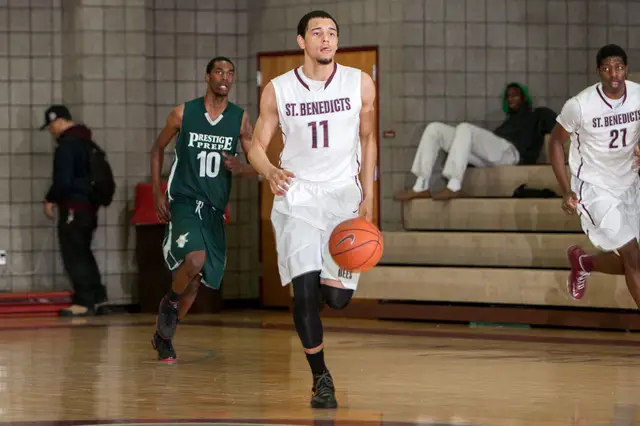
Courtesy of St. Benedicts Prep
Five hundred ninety-eight.
That was St. Benedict’s ranking after Tyler’s first year at the school. After head coach Roshown McLeod resigned in April 2011 following a 13-12 campaign. After all the non-seniors split for greener pastures.
Other prep schools swarmed to Tyler. He could have gone anywhere, St. Benedict’s assistant coach Bob Farrell said.
But two years later, Tyler would lead the Gray Bees to the national championship game.
It all started with a trip to Newark Liberty International Airport in spring 2011 when newly hired head coach Mark Taylor picked him up.
“He was unsure what he was going to do,” Taylor said. “He really didn’t know. But I gave him a lot of credit just getting on the plane, coming down and talking.”
Taylor and Farrell had only spoken with him over the phone at this point, but they knew the program’s immediate success hung in the balance of that conversation.
“If you commit to us, we’re going to commit to you,” Taylor told Tyler. “This is your team. We’ll build the pieces, but we’ve got to have a point guard that has the ability and the IQ that you have, and everything else will fall into place.”
He stayed.
St. Benedict’s won a school-record 35 games en route to the No. 2 ranking in New Jersey that year, as Tyler was named Gatorade New Jersey Player of the Year.
As a senior he led the Gray Bees to the No. 2 national ranking and just seconds from a national title.
When he didn’t make the McDonald’s All-American team, Tyler dropped a school-record 53 points on Eastern (N.J.). When highly acclaimed Princeton Day Academy star Aquille Carr talked smack to him on the court, Tyler scored 10 straight points on “the Crimestopper.”
Tyler helped the Gray Bees snap No. 1 Findlay Prep’s 54-game winning streak, then St. Anthony’s 83-game streak.
“He’s a true gamer,” Farrell said. “If you’ve got to send somebody to hit free throws in the last few seconds or take that last shot, Tyler would be my guy.”
Tyler was Farrell’s guy off the court, too. The strict Monday-to-Friday confines of St. Benedict’s were often difficult for Tyler. He would complain about the living situations, Bob’s wife Michelle Farrell said, like being unable to have food in his room.
But more than anything, he just needed a change of environment from Newark.
So on weekends without basketball games, he stayed at the Farrell’s home in Point Pleasant Beach. He became part of the family, walking or biking to the nearby Jersey Shore regularly with the Farrell’s son Matt, and attended family dinners on Sunday — the quiet Canadian surrounded by as many as 20 boisterous Italians.
“I remember the first time he came and my husband introduced me to him,” Michelle said, “he talked so quiet I couldn’t understand him.
“He had to repeat himself, and I finally just said, ‘If you want to stay here, you’re definitely going to have to speak up because nobody can hear you.’”
Gradually, Tyler became comfortable there. He learned Michelle would take care of his laundry for him and cook him pork roll, egg and cheeses on a hearty bagel each morning.
The bedroom he slept in each weekend became Tyler’s room, and the family support from the Farrells allowed him to stay focused on basketball and maintaining his control on the court.
“He was part of the family,” Michelle said. “That was just another one of my kids out there.”
C.J. Fair, Jerami Grant, Rakeem Christmas and Michael Gbinije all agreed: They haven’t seen Tyler get frustrated on the court once.
Through two months of practice, a four-game homecoming exhibition tour to Canada, Orange Madness and SU’s two scrimmages, Tyler has fit the bill as a smooth operator.
“The only time he gets frustrated is when I take the towel from him while he’s in the shower,” Gbinije said before cracking a smile.
Tyler said he’s comfortable with the weight placed on his shoulders. He wants it there.
Seemingly, Boeheim does, too. Before the season he said that Tyler would play 38 minutes per game this year.
More than the 35.3 per game that Gerry McNamara played as a freshman in SU’s 2003 championship season and the 35.5 that Jonny Flynn played as a freshman five years later.
That confidence shone through in Boeheim’s press conference after SU’s 79-41 win over Holy Family last Friday.
When asked about his assessment of Tyler’s performance, Boeheim merely shrugged.
“He was fine. I don’t even think about him.”


